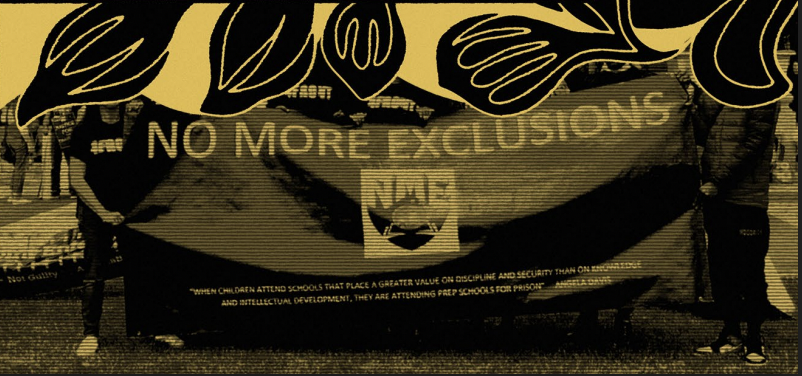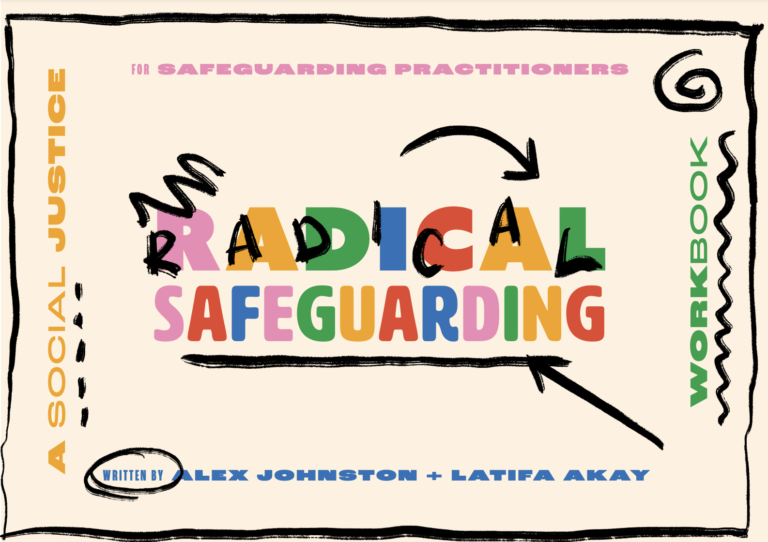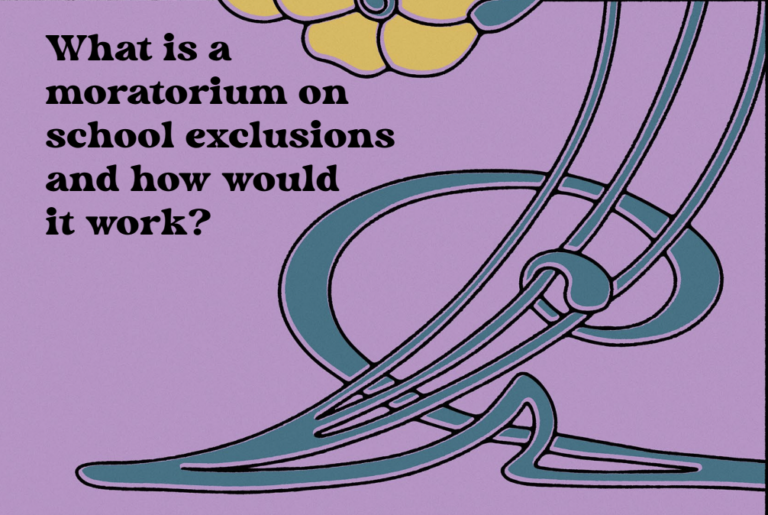Voices
Back to school with No More Exclusions: no child is beyond love and care in education
Why we all need to challenge school exclusions, and ways we can take action
Mumtaz Musa | 26 Sep 2022

Image credit: No More Exclusions.
Exclusions are a racial justice, a disability justice and a class issue.
At No More Exclusions (NME) we recognise the harmful nature of school exclusions and the ways in which they disproportionately target Black and Global Majority children, Gypsy, Roma and Irish Traveller children, children with special educational needs and/or disabilities, and those on free school meals.
NME does not seek reform, or to make exclusions less damaging or less disproportionate. We seek to completely end all forms of school exclusion and all types of segregated learning practices. This is because these practices are inherently harmful, abandon and traumatise already disadvantaged children and young people.
School exclusions feed the UK’s school-to-prison pipeline. This is reflected by the fact that a majority of UK prisoners have been excluded from school, and most children in the youth justice system have been temporarily or permanently excluded at some point during their education. This disproportionately impacts Black Caribbean boys in the UK in particular. It puts them at greater risk of deportation (as was nearly the case for Osime Brown) or even death (as was tragically the case for young Jaden Moodie). Angela Davis says “When children attend schools that place a greater value on discipline and security than on knowledge and intellectual development, they are attending prep schools for prison” (Davis, 2003, p39).
We must ask the question: why are the most marginalised children in the UK all too often faced with punishment when there’s an opportunity to model love and care? Just think of how much trauma we could prevent if we all dedicated some time and patience into those under our care. As organiser Mariame Kaba has said: “we must completely reject this carceral and punitive state practice and implement care and love in our communities, most especially with the children most affected by it, because “care is the antidote to violence” (Saidiya Hartman). (Kaba, 2021, p22)

This is just the start of our long road of organising. We will continue watering the seeds of abolition so we can grow something new, rooted in the values of transformative justice. Will you join us?
Here are seven ways to invite love and care into our education system:
1. Recognize the value of each individual voice
bell hooks approached education first and foremost from a place of love. If you haven’t read Teaching to Transgress, we recommend it - download a free PDF copy here. Here she writes “it has been my experience that one way to build community in the classroom is to recognize the value of each individual voice.” A culture of exclusion reinforces the idea of the disposability of a fellow human and tells the excluded student and their young peers that it’s not worth the time to understand what they’re trying to communicate.
As Clara Shalby has said, “we need to acknowledge that the child is not the reason why the environment is not working for them.” This connects to point 3 below.
2. Rethink ‘behaviour policies’
Behaviour is communication. When a child’s needs aren’t being met in the classroom, often they’re being perceived as ‘acting out’. What’s often perceived as ‘bad behaviour’ is really children responding that their needs aren't being met. Official statistics in England show that the top justification given for exclusions is ‘persistent disruptive behaviour’ - what classifies this however is subjective and open to high levels of bias - facilitating race and class-based discrimination. Also, behaviour policies often don’t make reasonable adjustment for young people with SEN meaning that neurodivergent young people are disproportionately punished and discriminated against because of their needs.
Challenging exclusions begins with refusing the idea that exclusions are an acceptable form of practice.
3. Advocate for investment in education that has the potential to foster love and care
The constant defunding and marketization of our education system means teachers are not working in environments that hold much prospect of fostering care and love. This has created a hostile environment where turnovers are at record highs, wellbeing among staff is at an all time low and due to fast track teaching programmes, many teachers are not connected to the local communities they work in. Hostile environments can create hostile and harmful behaviour and actions.
We can contribute our time to campaign for investment in our education system within the labour movement, for example the Stop School Cuts Campaign, or trade union members can use these model motions on our website. We can’t say we’re an anti-racist labour movement and stand for disability justice but stand by an education system that harms the most marginalised children.

4. Embrace collective learning
You might be thinking but what about the other 29 children in the class? We wrote 'What about the other 29: and other FAQs' for you! As we share in the report, exclusions are often justified as a way of protecting the children and young people allowed to remain in class. However, this presumes that teacher attention is part of a zero- sum game in which attention given to “disruptive” students will be at the expense of the education and future success of the “good” pupils in the room.
This line of thinking;
a) ignores how this issue is systemic - such as inflated class sizes and increased workloads, which are the fault of government policies, not individual students b) pits students against each other rather than encouraging them to learn together as peers c) argues that some children are expendable and their education unimportant.
We believe learning should be collective and everyone is of equal value. Because of the hierarchical structures that exist in schools, pupils rarely have a say in how and what they learn, so it makes sense that children may struggle to engage. To quote Carla Shelby “Rather than setting yourself up as the authority, set yourself up as a community of people all trying to figure out a very difficult thing together”.
This means working together to fight for an education system that values and supports better resourced spaces for co-facilitated learning and different learning styles. If we want to be in a world where all of us can give and receive dignity it is vital that our classrooms replicate the worlds we want to build and live in.
You can read more about challenging the idea that excluding “disruptive” children for the sake of their peers is the only way in our report. Please share this widely with anyone you know who works in schools.
5. Advocate for equity-centred trauma informed approaches to behaviour
Difficulty managing a young person’s mental health is often given as a reason as to why expulsion is the only option. To enable schools to manage the accelerating mental health crisis among young people, the government should be backing more holistic, trauma-informed approaches to behaviour that are designed to support pupils whose mental health struggles may lead to behavioural challenges, and vice versa. While we support the increased provision of school-based mental health services for early intervention, it can’t be down to schools alone to provide all the specialist support necessary. Along with other essential aspects of the NHS, Child and Adolescent Mental Health Services (CAMHS) has been woefully defunded over the last 20 years. The Government must properly fund and expand these support structures, rather than make young people suffer the consequences of their systemic underfunding and neglect.
If you are interested in learning more about trauma informed education, this round-up of resources is a great starting point. You can also support groups like CYPMHC who fight for appropriate mental health support for all young people.
6. Rethink ‘safeguarding’ and safety

Keeping everyone safe in school means developing radical alternatives to current safeguarding practice, while simultaneously building communities in and around school where transformative justice (ways of responding to violence in ways that don’t create more harm and violence) and healing can take place. Now, more than ever, we must be brave enough to imagine approaches to “safeguarding” and addressing the needs and troubles of young people that do not rely on punitive or carceral solutions.
If you are interested in this but don’t know where to start, the Radical Safeguarding Workbook is for you. It contains approaches, ideas and actions that practitioners in schools can take to work towards a safeguarding that actually holds the prospect of addressing the root causes of harm to children and young people.
7. Join us at NME in calling for a moratorium on school exclusions

In 2021 during the Covid 19 pandemic we launched our moratorium on school exclusions and called for a temporary suspension of headteachers’ powers to exclude. During this period we experienced the cognitive dissonance of the government introducing measures to ensure vulnerable young people were able to come to school, while simultaneously hundreds of the most vulnerable children continued to be excluded. As we outline in the section “Why is NME calling for a moratorium on school exclusions now?” here - if the Government genuinely wants to support vulnerable young people and families, it is urgent that it halts school exclusions without delay. After two years of instability, deprivation, anxiety and loss, we need investment in caring approaches that focus on children’s needs and wellbeing, rather than continuing to traumatise and cast young people out of their communities and educational spaces.
You can access our resources to support a moratorium on school exclusions here - or get in touch directly to join us in campaigning for this. For more ways to take action, see the Take Action section of our website.
Signed by
Mumtaz Musa for and with No More Exclusions